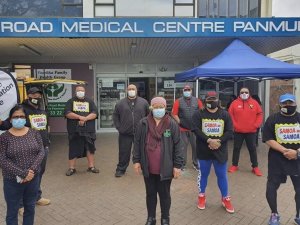Respiratory physician Lutz Beckert considers chronic obstructive pulmonary disease management, including the prevention of COPD, the importance of smoking cessation and pulmonary rehabilitation, and the lifesaving potential of addressing treatable traits. He also discusses the logic of inhaler therapy, moving from single therapy to dual and triple therapy when indicated, as well as other aspects of management
No contest – the word ‘vax’ dominates 2021
No contest – the word ‘vax’ dominates 2021

We are on our summer break and the editorial office is closed until 17 January. In the meantime, please enjoy our Summer Hiatus series, an eclectic mix from our news and clinical archives and articles from The Conversation throughout the year. This article was first published in the 15 December edition
The AntiVacks are assailing me...with all the force they can muster
'Vaxathon” was in the running, along with “vaxinista” and “double jabbed”, but “vax” was Word of the Year for 2021.
Vax is a flexible colloquialism that has meant vaccine or vaccination since 1983, and to vaccinate since 2009, according to Oxford Languages – publishers of the Oxford English Dictionary and selectors of word of the year.
Last year, one word was not enough. Oxford Languages produced a “Words of an Unprecedented Year” report that included “COVID-19”, “lockdown”, “social distancing”, “black lives matter”, “cancel culture” and “superspreader”.
But their lexicographers this year saw the word vax spike to appear 72 times more often by September than at the same time last year. Research into the word, and its derivatives such as “vax sites” and “fully vaxxed”, prompted them to publish a 33-page report looking into the 200-year history of vaccine language. Vax is most commonly used in North America, Australia and South-East Asia, the report says.
A vaxinista is someone who is “pro vax”, or who administers a vaccine, or anyone who has received a jab.
“[Vaxinista] emerged as a favourite depreciative term for a person who flaunts their vaccinated status and associated widening social and travel opportunities,” says the Oxford report.
As for vaxathon, New Zealand’s Super Saturday was no world first; Philadelphia held one in January.
Meanwhile, the polarising debate about vaccination led to derogatory terms “anti-faxxer” (for COVID-19 deniers) and “spreadneck” (for vaccine sceptics). The terms are modelled on “anti-vaxxer” and “redneck”.
And how about “vaxdar” – which is what you have when you can pick up whether someone is on your side of the vaccine debate (after “gaydar”, which came from radar).
“Jab” originated as American slang for vaccination, but is now most common in British English, with “shot” now the most common term in use stateside.
In Scotland, “jag” is a frequent alternative to jab. The Oxford report found these actual quotes: “Health service staff are best placed to jag arms with COVID vaccines” and “Double-jagged holidaymakers will no longer have to pay for PCR tests”.
English doctor Edward Jenner’s pioneering work on vaccination against smallpox prompted the first recording of the word vaccine in English in 1799.
In its first appearance, vaccine meant cowpox as Dr Jenner coined the word variolae vaccinae for cowpox from the Latin vaccinus, meaning derived from a cow.
But by the end of 1800, vaccine had its modern meaning after Dr Jenner used cowpox pustules to inoculate people against the similar but deadlier disease, smallpox.
The verb vaccinate and noun vaccination had their first recorded use in 1800 and vaccinator followed in 1801.
The report says a letter from the venerable Dr Jenner himself is the first recorded instance of anti-vax. He wrote in 1812: “The Anti-Vacks are assailing me...with all the force they can muster in the newspapers.”
But anti-vax did not become widely used until late in the 21st century.
1926: Diphtheria immunisation first offered in selected schools and orphanages
1940: Tetanus vaccine introduced and used widely by armed forces during World War II. First becomes readily available with arrival of childhood DTwP [diphtheria, tetanus and whole-cell pertussis] vaccine in late 1950s. Adult tetanus boosters followed and were combined with diphtheria [Td] from 1994 and with pertussis [Tdap] since 2020
1941: Routine immunisation begins for children under seven years old by then school Medical Service and Plunket society
1945: Pertussis (whooping cough) vaccine introduced in 1945 by Department of Health but only available on request. A combined vaccine with diphtheria arrived in 1953, but immunisation against whooping cough only became universal with arrival of DTwP. In 2000 the acellular pertussis vaccine was introduced and DTwP was replaced with DTaP
1948: BCG (tuberculosis) immunisation introduced initially for nurses then later to adolescents. Universal screening and vaccination of 13-yearolds stops in South Island in 1963, phased out in North Island in 1980s and ceases in 1990
1956: Polio vaccination begins with the arrival of limited supplies of the Salk inactivated polio vaccine (IPV). First offered only to eight to nineyear-old children then widened by 1960 up to the age of 21 years. The Sabin oral polio vaccine was introduced in August 1961. Switch made from OPV to IPV in 2002
1960: Routine childhood immunisation schedule is introduced with DTwP being supplied to general practices free of charge
1969: Measles introduced to national immunisation schedule for children aged 10 months to five years old who had not had measles
1970: Rubella vaccination for children aged four and school-based programme for children aged five to nine years old
1988: Hepatitis B added to schedule for all infants
1990: Mumps immunisation added to schedule with introduction of MMR (measles-mumpsrubella) vaccine at 12–15 months
1994: Haemophilus influenzae type b (Hib) added
1997: Funded influenza vaccine starts for people over 65. By 2015, flu vaccine is funded for highrisk conditions across the age spans
2004: Meningococcal B (MeNZB) used as epidemic control vaccine between 2004 and 2008
2008: Human papillomavirus (HPV) vaccination first offered to girls at age 12 with catch-up programme to young women. Also Pneumococcal vaccines for infants added to schedule
2014: Rotavirus vaccine introduced to schedule
2017: Chicken pox (varicella) added to schedule and funded HPV vaccination extended to all males and females 26 years and under
2018: Herpes zoster vaccine introduced for adults aged 65 years, plus catch-up programme for adults aged 66 to 80 years, ending on 31 December 2021
2021: Mass COVID-19 vaccination campaign starts in February and is extended to young people aged 12 to 15 years, August 2021
Source: Immunisation Handbook 2020, Ministry of Health
We're publishing this article as a FREE READ so it is FREE to read and EASY to share more widely. Please support us and our journalism – subscribe here







![Barbara Fountain, editor of New Zealand Doctor Rata Aotearoa, and Paul Hutchison, GP and senior medical clinician at Tāmaki Health [Image: Simon Maude]](/sites/default/files/styles/thumbnail_cropped_100/public/2025-03/Barbara%20Fountain%2C%20editor%20of%20New%20Zealand%20Doctor%20Rata%20Aotearoa%2C%20and%20Paul%20Hutchison%2C%20GP%20and%20senior%20medical%20clinician%20at%20T%C4%81maki%20Health%20CR%20Simon%20Maude.jpg?itok=-HbQ1EYA)
![Lori Peters, NP and advanced health improvement practitioner at Mahitahi Hauora, and Jasper Nacilla, NP at The Terrace Medical Centre in Wellington [Image: Simon Maude]](/sites/default/files/styles/thumbnail_cropped_100/public/2025-03/2.%20Lori%20Peters%2C%20NP%20and%20advanced%20HIP%20at%20Mahitahi%20Hauora%2C%20and%20Jasper%20Nacilla%2C%20NP%20at%20The%20Terrace%20Medical%20Centre%20in%20Wellington%20CR%20Simon%20Maude.jpg?itok=sUfbsSF1)
![Ministry of Social Development health and disability coordinator Liz Williams, regional health advisors Mary Mojel and Larah Takarangi, and health and disability coordinators Rebecca Staunton and Myint Than Htut [Image: Simon Maude]](/sites/default/files/styles/thumbnail_cropped_100/public/2025-03/3.%20Ministry%20of%20Social%20Development%27s%20Liz%20Williams%2C%20Mary%20Mojel%2C%20Larah%20Takarangi%2C%20Rebecca%20Staunton%20and%20Myint%20Than%20Htut%20CR%20Simon%20Maude.jpg?itok=9ceOujzC)
![Locum GP Helen Fisher, with Te Kuiti Medical Centre NP Bridget Woodney [Image: Simon Maude]](/sites/default/files/styles/thumbnail_cropped_100/public/2025-03/4.%20Locum%20GP%20Helen%20Fisher%2C%20with%20Te%20Kuiti%20Medical%20Centre%20NP%20Bridget%20Woodney%20CR%20Simon%20Maude.jpg?itok=TJeODetm)
![Ruby Faulkner, GPEP2, with David Small, GPEP3 from The Doctors Greenmeadows in Napier [Image: Simon Maude]](/sites/default/files/styles/thumbnail_cropped_100/public/2025-03/5.%20Ruby%20Faulkner%2C%20GPEP2%2C%20with%20David%20Small%2C%20GPEP3%20from%20The%20Doctors%20Greenmeadows%20in%20Napier%20CR%20Simon%20Maude.jpg?itok=B0u4wsIs)
![Rochelle Langton and Libby Thomas, marketing advisors at the Medical Protection Society [Image: Simon Maude]](/sites/default/files/styles/thumbnail_cropped_100/public/2025-03/6.%20Rochelle%20Langton%20and%20Libby%20Thomas%2C%20marketing%20advisors%20at%20the%20Medical%20Protection%20Society%20CR%20Simon%20Maude.jpg?itok=r52_Cf74)
![Specialist GP Lucy Gibberd, medical advisor at MPS, and Zara Bolam, urgent-care specialist at The Nest Health Centre in Inglewood [Image: Simon Maude]](/sites/default/files/styles/thumbnail_cropped_100/public/2025-03/7.%20Specialist%20GP%20Lucy%20Gibberd%2C%20medical%20advisor%20at%20MPS%2C%20and%20Zara%20Bolam%2C%20urgent-care%20specialist%20at%20The%20Nest%20Health%20Centre%20in%20Inglewood%20CR%20Simon%20Maude.jpg?itok=z8eVoBU3)
![Olivia Blackmore and Trudee Sharp, NPs at Gore Health Centre, and Gaylene Hastie, NP at Queenstown Medical Centre [Image: Simon Maude]](/sites/default/files/styles/thumbnail_cropped_100/public/2025-03/8.%20Olivia%20Blackmore%20and%20Trudee%20Sharp%2C%20NPs%20at%20Gore%20Health%20Centre%2C%20and%20Gaylene%20Hastie%2C%20NP%20at%20Queenstown%20Medical%20Centre%20CR%20Simon%20Maude.jpg?itok=Z6u9d0XH)
![Mary Toloa, specialist GP at Porirua and Union Community Health Service in Wellington, Mara Coler, clinical pharmacist at Tū Ora Compass Health, and Bhavna Mistry, specialist GP at Porirua and Union Community Health Service [Image: Simon Maude]](/sites/default/files/styles/thumbnail_cropped_100/public/2025-03/9.%20Mary%20Toloa%2C%20Porirua%20and%20Union%20Community%20Health%20Service%20in%20Wellington%2C%20Mara%20Coler%2C%20T%C5%AB%20Ora%20Compass%20Health%2C%20and%20Bhavna%20Mistry%2C%20PUCHS%20CR%20Simon%20Maude.jpg?itok=kpChr0cc)